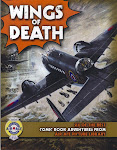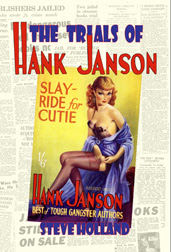It ran for almost 400 issues between 1974 and 1981, after which, Jinty suffered a ("great news, girls!") merger, although after eight months of Tammy & Jinty, the front cover unceremoniously dropped "& Jinty" from the title. I believe only one serial (Pam of Pond Hill) lasted more than a couple of years in the combined paper.
In 2014, however, a website was launched to celebrate the comic. It attracted a great deal of attention as it revealed some of the wonderful, odd and downright bizarre tales that had appeared in the paper, which had a far higher proportion of science fiction and fantasy stories than any other girls' title of the era. Today it might be second only in interest to Misty amongst fans trying to track down issues.
So Rebellion's reprinting of two serials will be welcome. The book is the latest in Rebellion's Treasury of British Comics, which has already turned up some gems and I think these two tales can be counted among them.
According to its author Pat Mills, "Land Of No Tears" was inspired by his reading of religious primers, specifically the writings of St. Francis de Sales, who rejected emotion for spiritual advancement, describing tears and tenderness as "snares of the devil." An apt choice as Francis is the patron saint of writers and journalists, although the sentiment is odd for a man who was meant to be so gentle and patient.
In an opening that would almost certainly not be allowed nowadays, we find that Cassy Shaw, born with one leg shorter than the other, has used her very visible disability (she wears a surgical shoe and leg-brace) to excuse her laziness and to make herself the centre of attention. When her parents announce that she is to undergo an operation, Cassy is furious, but unable to persuade her parents or the hospital otherwise.
However, while she is under anaesthetic, Cassy appears to go into a coma. She awakens to find herself in the ruins of the hospital; a passing girl explains that hospitals – hives for the diseased and imperfect – are no more. Cassy's emotional response is immediately rebuked: "Such showing of emotion is strictly forbidden. If your hive mother was here, you would be severely punished," she is told.
The girl, Perfecta, apologizes for her own terrified outburst. Cassy later discovers that she has been projected into a future where children are separated from their parents at the age of four and raised by strict disciplinarian hive mothers. Cassy is classified as a Gamma due to her "grade one deformity" and treated as a slave, sharing a grim dormitory with other Gammas, who are treated like maids and cleaners by Alphas like Perfecta.
Cassy persuades the Gammas to train for the Golden Girl sports award to prove that they are the equals of the perfect Alphas.
Lost friendships and strained parental relationships were key to many of the girls' comic serials of the time, and Mills was one of a handful of writers who could bring together the right mix of social commentary dressed up as distopian science fiction – the utter lack of empathy for the disabled can be seen in the attitudes of the current government – and emotional interplay between characters.
Malcolm Shaw, whose name was known only to a few until a couple of years ago, has been a big part of recent Misty reprints, and he pops up again here with an animal rights tale in a whisper-thin disguise entitled "The Human Zoo."
On a trip to the zoo, Jenny Lewis mocks her twin sister, Shona, for caring too much about the animals. Later, the girls and their classmates are abducted by aliens and put aboard a spaceship alongside a variety of Earth animals before being launched on a nine month space journey.
Fitted with collars that deliver electric charges, the Earth creatures – zebras, camels, humans – are auctioned off to zoos on an alien planet with two suns.
Their new owner's child, Tamsha, seems to think the same way as Shona – that even zoo animals should be treated with dignity and respect. She takes Shona for a walk but when Shona writes her name, Tamsha thinks of her only as a special kind of pet with limited intelligence, the aliens having abandoned writing since they developed telepathy.
Shona is given to Tamsha for her birthday and is taken, as part of Tamsha's birthday treat, to the zoo, where her classmates and other humans are undergoing a humiliating "Chimp's tea party." Shona runs amok and is returned to the zoo cage, her owner planning to have her put down before she infects the rest of the herd.
Rather than being killed, she is sold to an alien circus where she is trained to do tricks. The aliens fear water, so Shona is dressed as one of them and topples into a tank, to be saved by another creature that resembles a two-headed goat. Tamsha, angry that her pets have been sold to the circus and pitying their cruel lives, rescues them and drops them off at the edge of the city... where it looks like Shona will die in the wilderness.
Like Mills, Shaw balanced action, social commentary and emotion into a timeless story. I am prepared to be shot down here, but having the characters in school uniform means that the strips seem barely to have aged. Maybe the lack of outrageous hairstyles and individuality in clothing choices is what dates the strips. No matter... I'm sure these will be nostalgia buys for mums who remember Jinty from their girlhood.
There are still dozens of fascinating stories from the pages of Jinty that deserve to be rescued: The Robot Who Cried, Worlds Apart, The Forbidden Garden, Fran of the Floods and dozens of others. Who wouldn't want to read Blind Ballerina, Who's That In My Mirror or Merry of Misery House? Let's hope that Jinty gets the second volume that Misty recently had.
Jinty: Land Of No Tears and The Human Zoo by Pat Mills, Malcolm Shaw & Guy Peeters. Rebellion ISBN 978-1781-08624-7, 28 June 2018, 144pp, £10.99. Available via Amazon.
Subscribe to:
Post Comments (Atom)


























































No comments:
Post a Comment